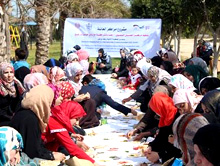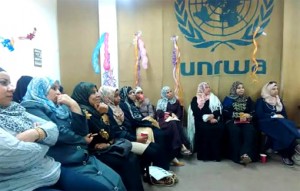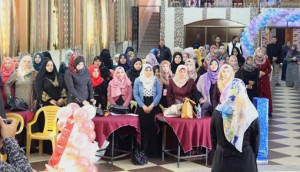
Event in the Rafah refugee camp (Gaza/Palestine) on the occasion of the International Women’s Day 2016. Foto: © GIZ
Ramallah, West Bank/Palestine – “You should go and work in a store not as a taxi driver!” A young Palestinian man is taking a taxi in Ramallah´s city centre and cannot believe that a young woman is driving the taxi. Indeed, this young lady is driving the taxi but only for a few hours in order to figure out how the community will react to this different role of women within the Palestinian society. People are asking why a woman is driving a taxi. Some are amused, some are just curious, some are shocked. It is not common in the Palestinian society that women drive taxis. At the same time women are selling herbs and cheese at the market in Ramallah and tell their stories and challenges to a camera team organised by the GIZ partner organisation REFORM. Through these initiatives many controversial discussions about the role of Palestinian women started in the community especially through social media. And these discussions are going to be continued organised by REFORM (The Palestinian Association for Empowerment and Local Development).
Videos documenting the events can be accessed here:

Event in the Husn refugee camp on the occasion of the International Women’s Day in March. Foto: © GIZ
Husn refugee camp, Jordan – “Celebrate yourself! You have the right to live and to enjoy! You have the right to work! Go on! Continue learning! You are here, and you will always be! You are free!” Palestinian refugee women from Husn and Talbieh refugee camp in Jordan finalize a full day event on the occasion of the International Women´s Day 2016 with this statement. The displacement of the Palestinian refugees in 1948 has also changed the roles of men and women in the families. In this context, some general trends can be observed including the tendency of women towards taking more and different responsibilities such as family support and protection. Some families had to experience poverty for the first time in their life and therefore, women got more responsibilities in order to provide the best living conditions to their families.
Rafah refugee camp, Gaza/Palestine – In Rafah Family Centre women are celebrating the International Women´s Day 2016 in order to honour women who made a change in the life of their families and their community. The event includes success stories, folklore shows, a photo gallery and embroidery exhibitions made by women at the handcraft corner of the centre. The women are looking forward to the exchange and discussions with other women and relax from their daily businesses.
In general the living conditions of the Palestinian refugees have been marked by years of dependence, hopelessness, depression and social divisions, and have given rise to lethargy. They destroy social networks, self-help potential and the social spaces in which the affected people can participate in improving their life prospects. Especially women and other marginalized groups are affected by the situation.
Furthermore, the situation of the Palestinian refugees differs greatly in the region with regards to freedom of movement, possibilities of employment and social participation. It depends upon regional differences and on whether the refugees live within or outside of the refugee camps. Since 1948 more than five million Palestinian refugees have been registered at the United Nations Relief and Works Agency for Palestine Refugees in the Near East (UNRWA). Roughly one-third live in 58 refugee camps in the Palestine, Jordan, Syria and Lebanon.
The activities in Palestine and Jordan in March 2016 were organised by partner organisations of the GIZ programme FASPAR “Facilitating Social Participation of Palestinian Refugees” in order to give Palestinian refugee women the possibility to reflect on their roles and responsibilities as well as new ways of creative thinking and behaviour within their society. “Being a voice not an echo” is a central topic regarding the role of women in the Palestinian society that is being more and more discussed especially amongst women themselves and not only on the occasion of the International Women´s Day.
FASPAR was established by the German Federal Ministry of Economic Cooperation and Development (BMZ) in 2014.


